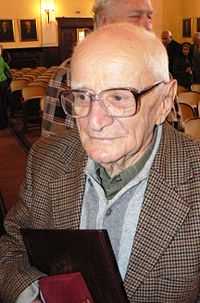Valeri Petrov

Valeri Petrov (Bulgarian: Валери Петров), pseudonym of Valeri Nisim Mevorah (Валери Нисим Меворах) (born 22 April 1920) is a popular Bulgarian poet, screenplay writer, playwright and translator of paternal Jewish origin.
Born in the capital Sofia to lawyer Nisim Mevorah (and Bulgarian ambassador to the USA in 1945 - 47 and representative to the UN) and high-school French teacher Mariya Petrova, Valeri Petrov studied at the Italian School in the city, finishing in 1939. He graduated in medicine from Sofia University in 1944.
When he was 15, Valeri Petrov published his first independent book: the poem Ptitsi kam sever ("Birds Northwards"). In this and subsequent publications he used his non-Jewish mother's surname or other pseudonyms because of the pro-Nazi regime in Bulgaria at the time.[1] He later wrote the poems Palechko ("Tom Thumb"), Na pat ("En route"), Juvenes dum sumus, Kray sinyoto more ("By the Blue Sea"), Tavanski spomen (A Reminiscence from an Attic) and the series Nezhnosti ("Endearments"). Valeri Petrov is particularly esteemed for the quality of his translation of the entire works of Shakespeare - the authoritative rendition of the Bard in Bulgarian.
In the autumn and winter of 1944, when Bulgaria switched sides and joined the Allies in the Second World War, Valeri Petrov worked first at Radio Sofia and then as a wartime writer with the newspaper Frontovak ("Front Fighter"). Following the war, he was among the founders of the humoristic newspaper Starshel ("The Hornet") and its assistant editor-in-chief (1945–1962). He served as a doctor in a military hospital and in the Rila Monastery.
Between 1947 and 1950 Valeri Petrov worked in the Bulgarian legation in Rome as a press and cultural attache. During the time he travelled to the United States, Switzerland and France, delegating to various forums.
He has also been an editor in a film studio and in the Balgarski pisatel publishing house. He served as a deputy in the Grand National Assembly. Since 2003, he is an academician of the Bulgarian Academy of Sciences. Politically, he has been a leftist and a socialist ever since his school-time in the Third Bulgarian Kingdom, through the Communist period and up to the present day.[2]
Works
- 1945 — Stari neshta malko po novomu ("Old stuff in a somewhat new way", poetical series
- 1949 — Stihotvoreniya ("Poems"), a book of poetry
- 1956 — screenplay for the film Tochka parva ("Item One")
- 1958 — Kniga za Kitay ("A Book about China"), travel notes
- 1958 — screenplay for the film Na malkiya ostrov ("On the Small Island")
- 1960 — V mekata esen ("In the Mild Autumn"), a poem; awarded the Dimitrov Award
- 1962 — Improvizatsiya ("Improvisation"), a stage play co-written with Radoy Ralin
- 1962 — Poemi, a collection of poems
- 1962 — screenplay for the film Slantseto i syankata ("The Sun and the Shadow")
- 1965 — Kogato rozite tantsuvat ("When Roses Dance"), a stage play
- 1965 — Afrikanski belezhnik ("An African Notebook"), travel notes
- 1966 — screenplay for the film Ritsar bez bronya ("A Knight without an Armour")
- 1970 — Na smyah ("In Jest"), satirical poems
- 1970–1971 — translations of Shakespeare's Comedies, two volumes
- 1973–1974 — translations of Shakespeare's Tragedies, two volumes
- 1977 — Byala prikazka ("A White Fairy Tale")
- 1978 — Kopche za san ("A Dream Button")
- 1981 — screenplay for the film Yo Ho Ho - later adapted into the 2006 film The Fall
- 1986 — Pet prikazki ("Five Fairy Tales")
- 1990 — Selected Works, two volumes
References
- ↑ Биография
- ↑ Крумов, Красимир. Социалистическият социум и Валери Петров. Част 2. В.Култура, брой 16, 9 април 2004 г.
- "85 години от рождението на Валери Петров" (in Bulgarian). Регионална библиотека "Любен Каравелов", Русе. Retrieved 2007-01-14.
- "АКАД. ВАЛЕРИ ПЕТРОВ доктор хонорис кауза на СВУБИТ" (in Bulgarian). СВУБИТ. 2006-05-18. Retrieved 2007-01-14.
External links
- Website about Valeri Petrov (Bulgarian)
- Valeri Petrov at the Internet Movie Database
|